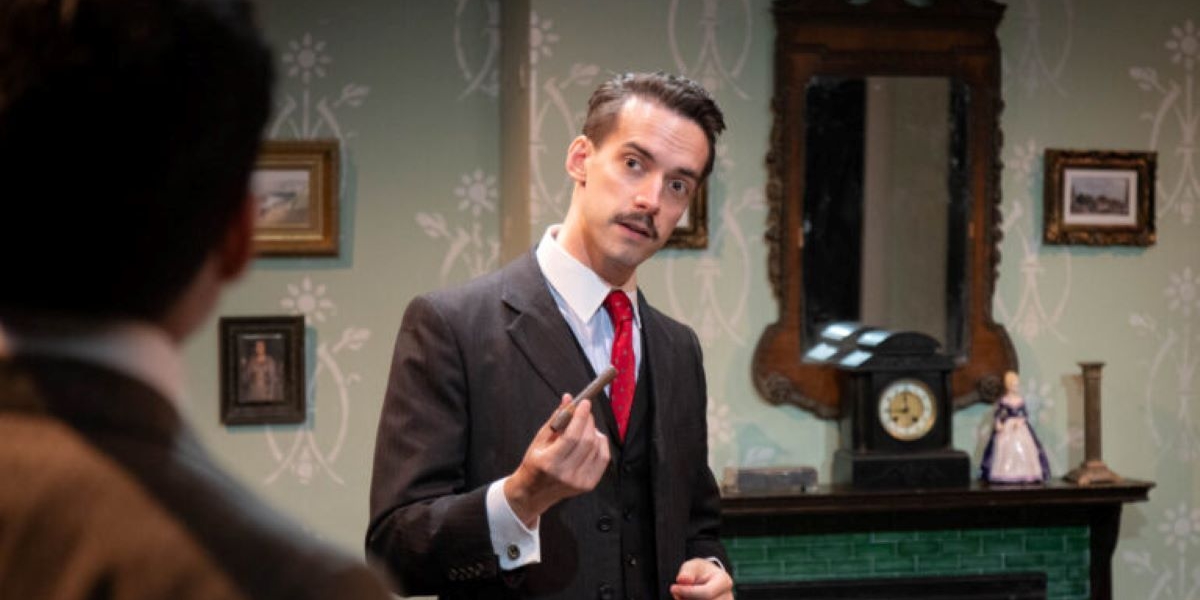The Finborough Theatre has for many years made the case for neglected drama from the Edwardian Era, particularly plays associated with Annie Horniman’s Gaiety Theatre in Manchester that tackled important social issues of the day. These revivals have revealed well-made, thought-provoking dramas with points to make that are still of compelling relevance. In particular we have learned more about contemporary female playwrights tackling the dilemmas of women in a nuanced and memorable fashion.
Such is the abiding memory of the current triple-bill of one-act plays, all of which created a stir on the eve of the First World War before sliding into undeserved oblivion. The first two, which lend their titles to the evening overall, look at the same characters separated by an interval of a few years. They are the work of Gertrude Robins, a truly remarkable person, whose qualities as a dramatist were noted by critics at the time in the same breath as Shaw and Galsworthy. An actor, farmer and pilot, as well as wife and mother, she died early in 1917 at only 37 leaving a legacy of fine one-act plays that deserve fresh examination.
‘Makeshifts’ examines the dilemmas facing unmarried women of very limited means where marriage opportunities are limited and professional advancement blocked either through discrimination or the absence of adequate education. Caroline and Dolly live with their widowed mother, with the former keeping house and the latter working as a primary school teacher. The action is punctuated by their interactions with the male lodger, Henry Thompson, and a ‘cheeky-chappy’ stockbroker, Albert Smythe. The key scenes involve the latter who toys with both the girls before declaring that he will be marrying neither, instead pursuing Rose, a girl with her own money. The second play ‘Realities’ follows through the action to look at most of the cast again a few years down the line. Again the disruptive, selfish, gaslighting behaviour of Albert is the frame, but we also get to meet Rose, his wife, while much of the action is seen through the eyes of Caroline, now married to Henry Thompson. Throughout the dialogue is tight, the characterisations detailed and the confrontations plausibly prepared and developed. Without being in the slightest preachy, these plays dramatise the burdens of women on the margins of society with empathy and humour.
The cast is uniformly excellent. Philippa Quinn inhabits the long-suffering Caroline with great skill: every considered, wry expression and care-worn gesture adds to the portrait of someone with unrealised dreams and disappointmented aspirations. As her more pragmatic, tough-minded sister, Poppy Allen-Quarmby is an excellent foil and Akshay Sharan offers slow-burn excellence as the quiet respectful lodger who later reveals a hidden moral toughness. Beth Lilly invests the brittle, glamorous surfaces of Rose with a clear sense of the dissatisfactions underneath; and Joe Eyre delivers a powerful, at times magnetic performance as Albert, the flashy, restless, self-absorbed villain of the piece – all the more convincing for projecting charm and vulnerability too.
The final section of the evening is given over to ‘Honour Thy Father’, a play by H.M.Harewood, much more of a fixture than Robins in the London theatre of the day, but on this showing considerably the lesser playwright. This is a straight-forward progressive ‘problem’ play in which a bankrupted family living in exile thanks to the father’s gambling turns out to be financed by the elder daughter’s recourse to prostitution back in London. Conventional patriarchal values are challenged and the rights of the modern woman asserted in a fairly programmatic way, without the witty play of paradox that Shaw brings to this subject matter. But there are some feisty confrontations and well-written speeches which are delivered to a similar standard of excellence as in the first plays, despite some melodramatic moments.
Poppy Allen-Quarmby returns with a blast as the daughter Claire who will not accept any moral reproofs from Andrew Hawkins as her blustering and blundering father. Suzan Sylvester provides a convincing portrait of the weak and wan mother, Jane, taking refuge in knitting and puzzles to dodge life’s problems; and Beth Lilly loses a couple of decades from her previous role in creating the role of the younger daughter, innocently unaware of the family’s precarious situation. Sharan and Quinn complete the cast in minor roles.
As usual at the Finborough the challenge of a tiny, intimate venue brings out the best in designers. Alex Marker’s set establishes meticuously fussy period interiors in the most economical of gestures, and incorporates some nifty changes between plays. The direction of Melissa Dunne ensures that these are never static tableaus with plenty of convincing moments of both violence and intimacy, and delicate variations of pace. All in all a thoroughly absorbing evening at the theatre.

